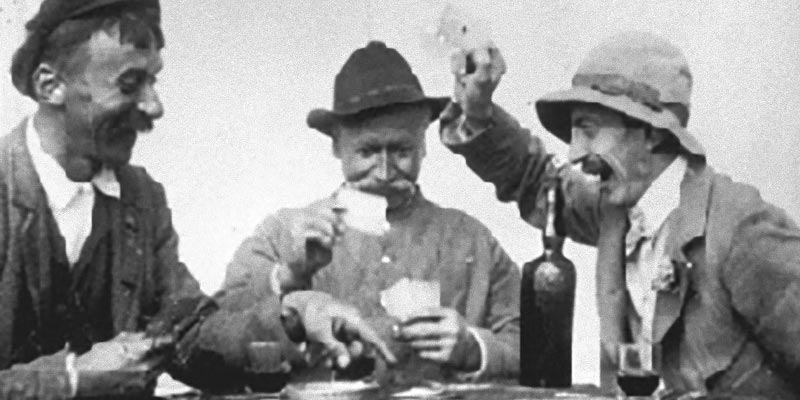Many Bridge players lament that three-handed variations lack the real game’s complexity. On the other hand, one of the best three-handed card games around—Skat, the German national card game—is filled with arbitrary rules that are off-putting to initiates.
Hence Whiskey (from Whist + Skat—say it quickly), which takes some of the best features from each game to solve the three-player dilemma.
The Object
The object of the game is to be the first to score 100 points by winning or losing a specified number of tricks.
The Setup
Whiskey uses a standard 52-card deck, with cards ranked from ace (high) to 2 (low). Suits have no rank.
Dealer passes out 13 cards to each player and a dummy hand, proceeding clockwise. After all cards are dealt, two cards from the dummy are turned face up.
The Bidding
Each hand of Whiskey may be played with a trump suit or in notrump. Since choosing the kind of game to be played confers a distinct advantage, a player must earn the right to do so. Each hand therefore begins with an auction, and whoever makes the highest bid becomes declarer (the player who can choose—or declare—the kind of game to be played).
Since the only currency of the game is tricks, each bid represents a number of tricks. In Bridge, the object of the game is always to win tricks, so players who happen to be dealt high cards have an unfair advantage. Whiskey borrows from Skat the idea of playing either to win or to lose tricks, depending on your hand.
The dealer bids first; players then take turns bidding, proceeding clockwise. As with any auction, each bid must be higher than the previous; a player may also pass. After each bid or pass, another card from the dummy is exposed.
Each player can bid the number of tricks (1–13) s/he plans to win or lose. The player may instead pass or double the current highest bid. Doubling means that declarer’s final score or penalty will be twice the normal value. Only the current highest bid can be doubled, and any new bid cancels the double. (Of course, that new bid may be doubled!) A player whose bid is still doubled may redouble, which will multiply the final score or penalty by 4. Any successive bid cancels both the double and the redouble.
Bidding ends when all three players pass. The person who made the highest bid becomes declarer.
The Play
The entire dummy is exposed and placed across from declarer. During the hand, declarer will play from the dummy just as if it were another player sitting between the defenders. Any tricks won by the dummy hand count toward declarer’s total.
After seeing the dummy, declarer announces whether s/he will try to win or lose the number of tricks bid and names a trump suit or notrump. The other players form a partnership to stop declarer.
Player to declarer’s left leads to the first trick, and each hand (including dummy) plays a card, following if possible and playing any card if not. The highest card of the suit led, or the highest trump, wins the trick. The winner of each trick leads to the next until all 13 tricks have been played.
Scoring
If declarer made the bid exactly (won or lost the exact number of tricks bid), s/he earns 10 points. If declarer was off by exactly one trick in either direction, s/he wins 5 points. If declarer is off by two tricks in either direction, s/he loses 5 points, and if declarer is off by three or more tricks in either direction, s/he loses 10 points.
DOUBLE/REDOUBLE: Doubling multiplies the score by two (whether positive or negative), and redoubling multiplies it by four.

